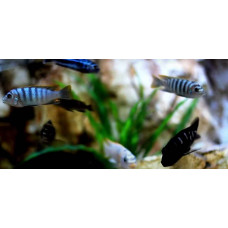From gene and French fond, base.
The set of all genes in a fish population. A term used in population genetics to describe the totality of all gene variations (alleles) in a given population, species.
A population has all its alleles for optimal adaptation to the environment.
We can also speak of a single gene pool of a species, since gene exchange occurs between different populations of a species.
If there is only one allele of a particular gene in the entire population, the population is said to be monomorphic with respect to variants of that gene.
If there are several different variants of a gene in a population, it is called polymorphic. If the species in question has more than one set of chromosomes, the combined number of different alleles may exceed the number of organisms.
In most cases, however, the number of alleles is still smaller. Strong inbreeding often results in monomorphic populations with only one allele of many genes. One measure of the size of the gene pool is the effective population size. Ideally, the alleles of the entire population are distributed according to the Hardy-Weinberg law.
A larger gene pool with many different variants of individual genes leads to better adaptation of the offspring to the changing environment.
Allelic diversity makes it possible to adapt to change much more quickly if the appropriate alleles are already present than if they have to be introduced by mutation.
However, in an unchanging environment, a smaller number of alleles may be more advantageous, so that too many unfavourable allele combinations do not occur during sexual reproduction.
Gene pool
Tags: Genepool

